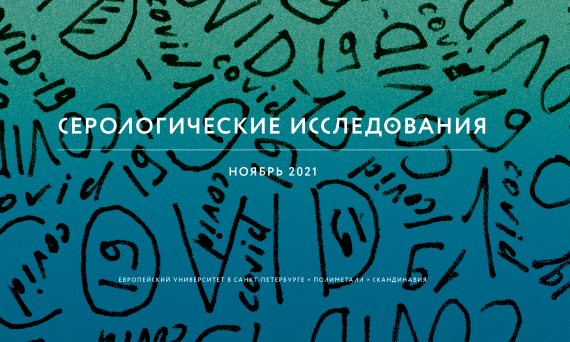According to the results of the new stage of a serological survey, more than 80% of adults in St. Petersburg have antibodies to SARS-CoV-2. Repeat infections (confirmed by PCR tests) are relatively rare events-under 3%. In order for the active phase of the epidemic to end, as many citizens as possible must have immune protection.
SAINT PETERSBURG — November 15, 2021
With support from Polymetal JSC, scientists from the European University at St. Petersburg, the Genetico laboratory and the Research Institute of A. A. Smorodintsev analyzed the results of the fifth stage of a representative study of population immunity to SARS-CoV-2 in St. Petersburg. The serosurvey was carried out in October 2021.
According to preliminary results, 83% of serosurvey participants had antibodies to the new coronavirus. The result was calculated after taking into account a correction for consent to participate in the study. The 95% confidence interval is between 80.6% and 85.5%. Among unvaccinated study participants, 78% had been ill with coronavirus.
Dmitry Skugarevsky, co-author of the study: “Since more than 40% of the city's residents had already been vaccinated, we invited vaccinated people for testing. In the spring of 2021, during the previous phase of the study, about 10% of the citizens were vaccinated."
Researchers calculated the proportion of people with antibodies after vaccination based on the type of vaccination. After vaccination with Sputnik V and Sputnik Light, antibodies were detected in 99% and 96% of the study participants. The proportion of people with antibodies who were vaccinated with KoviVac and EpiVacKorona was only 76% and 57%, which did not differ significantly from the same proportion of unvaccinated study participants. However, the number of participants vaccinated with CoviVac and EpiVacCorona was minimal.
To assess antibodies in the blood, as in the previous round of surveys, the researchers used two independently validated test systems — CoronaPass from Genetico laboratories and SARS-CoV-2-IgG-IFA-BEST from Vector-Best.
Anton Barchuk, Associate Professor of Population Medical Research at Polymetal JSC , co-author of the study:
“The significant number of carriers of antibodies in the population may explain why in the autumn, despite the absence of restrictions, there was no explosive increase in new cases and hospitalizations. However, 3-5% of sick St. Petersburg residents per month is enough to fill all the medical institutions in the city. Even if we assume that in order to stop the epidemic in St. Petersburg, 90% of residents should have antibodies, we will have several more months of the pandemic, especially if those who have not yet been ill do not get vaccinated. The course of the pandemic will largely depend on the duration of the immune defense against severe infection after the Sputnik V vaccination and the illness. Anyone who has been vaccinated with other vaccines should consider the option of revaccination with "Sputnik V".
Daria Danilenko, Deputy Director for Research at the Russian Health Ministry’s "A. A. Smorodintsev Influenza Research Institute”:
“Our immediate plans are to assess how long after the illness and the Sputnik V vaccination the antibodies persist. So far, there is no reason to assume that over time, the protection weakens precipitously. However, revaccination is needed, especially for people from vulnerable groups such as the elderly, cancer patients and those suffering from hematological diseases.”
Contact:
Alexandra Vasilyeva,
Research Spokesperson, Institute for Interdisciplinary Medical Research (IMMI)
Тел.: +7 (999) 525-72-97
e-mail: alvasilieva@eu.spb.ru
